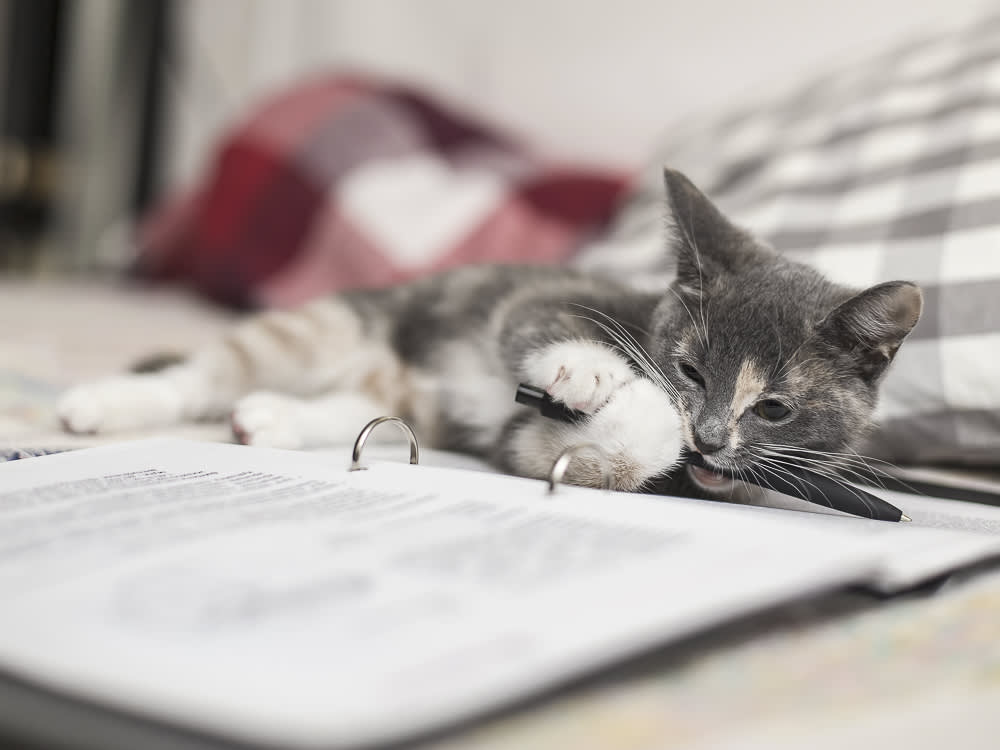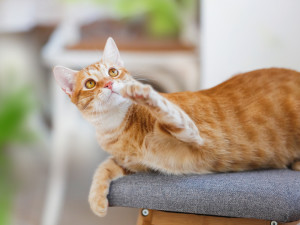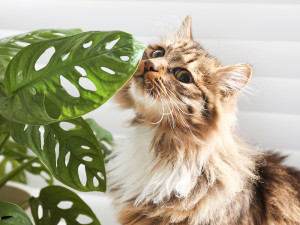Why Does My Cat Eat Plastic?
If your cat nibbles on pen caps and power cords, they could be bored...

share article

Your pet wants you to read our newsletter. (Then give them a treat.)
Every cat parent knows the sound of their pet crunching on plastic. You trace the noise to the living room and find your cat gnawing on a plastic bag, a power cord, or some random piece of trash that missed the bag. And they stop for a second and look at you like, “Do you mind? I’m in the middle of something.” A mangled red milk jug lid hanging from their lip. And you’re like, “Where the hell did you even find a milk jug lid — I’ve been off dairy for weeks!?” As you deftly snatch the milk jug lid away from them, they stare at you as though you just said that the cat next door is prettier than they are. (Which is ridiculous.) So you roll your eyes and throw away the milk jug lid — only to turn around and find your cat happily sucking on a pen cap. “Why, cat, why?!”
And when you take the offending object away, your cat looks at you like you’ve committed a crime. Maybe you’ve turned to the internet for answers, frantically typing in Google: “Why does my cat keep eating plastic?” Well…why are cats so attracted to plastic? Is their food not tasty enough? Are they bored? Do they just love the crunching sound plastic makes?
“Many cats are attracted to plastic,” New York-based cat behavior consultant Jennifer Van de Kieftopens in a new tab says. “Sometimes chewing on non-food items can be indicative of a nutritional deficiency. So you should consider whether your cat foodopens in a new tab is satisfying and of a high enough quality. I also sometimes find that people are overly calorie-conscious and are simply not feeding their cats enoughopens in a new tab.”
Your cat could be munching on plastic for a variety of reasons, but this behavior can easily lead to serious medical issues. So what do you do if your cat eats plastic? The Wildest dives into the mysterious love affair between cats and plastic and how you can stop your cat from putting this potentially dangerous material in their mouth.
What are the most common reasons why cats eat plastic?
If you’ve asked, “Why does my cat like eating plastic?” you’re definitely not the first cat parent to do so. Chewing on plastic is a form of picaopens in a new tab — the behavioral urge to eat non-edible materials, such as soil, clay, paper, or (sigh) plastic. There are any number of reasons why cats may eat plastic, from a lack of nutrients in their regular diet to health issues to simply curiosity about the world. Some cat breeds, such as Burmese and Siameseopens in a new tab, tend to be more prone to developing pica, so cat parents to these breeds may need to take precautions against this behavior. And if you’re ever concerned about your cat’s behavior or diet, it’s best to visit the vet ASAP.
Nutritional deficiencies
“Why is my cat addicted to eating plastic?” It may not be an addiction but simple hunger. If your cat chews on plastic or other items, it may be a sign that their dietopens in a new tab isn’t meeting their needs. Cats sometimes chew on plastic because they’re seeking nutrients that they don’t get from their food. Take the time to review your cat’s diet and determine whether your current cat foodopens in a new tab has all the proper nutrients they need to stay healthy.
Medical conditions
Chewing on plastic could be a sign of a larger health issue in your cat, such as gastrointestinal problemsopens in a new tab like an intestinal blockage or parasites. Much less likely but still a possibility are conditions like feline diabetes, anemia, or hyperthyroidism, all of which can, in some rare cases, result in a propensity for chewing plastic.
“If your cat is actually eating plastic, then the first thing that I would recommend is you have your cat assessed by your veterinarian to rule out gastrointestinal issues that could be contributing,” veterinarian Dr. Valli Parthasarathy says. “Also, keep plastic items out of reach of your cat as much as possible.”
Behavioral problems
Any type of excessive chewingopens in a new tab can be a sign that your cat is suffering from significant stress or anxiety. Consider whether there have been any big changes in your pet’s lifestyle, like a move to a new home or the addition of a new family member. Anxiety and stress can lead to changes in your cat’s behavior that may show up in new issues, like chewing plastic.
What are the signs of plastic ingestion in cats?
While a tiny nibble of plastic likely won’t hurt your cat, a larger piece could lead to severe medical issues. Keep an eye out for the symptoms of plastic ingestion in cats, including:
Vomiting, drooling, and/or diarrhea
Lethargy
Sudden reduction in or loss of appetite
Changes in behavior, such as reacting defensively when you pet them or pick them up
Abdominal pain
Weight loss
“If your cat is ingesting plastic, that is cause for concern,” Dr. Valli says. “Plastic can cause irritation to the stomach and intestinal lining, which could lead to vomiting and diarrhea. This can also cause gastrointestinal obstructions, which can be life-threatening.” And while plastic is definitely not a food, it’s a good idea to know what human foods are safe for your catopens in a new tab to consume.
How can I prevent my cat from eating plastic?
If you notice your cat chewing on something plastic, start by taking them to the vet and making sure there isn’t a medical cause for the behavior. Once you have the vet’s assurance that all is fine (medically, at least), try some of these preventative measures of a cat from eating plastic:
Redirect their attention to a favorite chew toy. Spray some catnip on the toy for extra incentive.
Play more often. Try mentally stimulating games like chasing or hunting.
Teach your cat new tricks. Training a catopens in a new tab takes patience and repetition, but you can eventually train your pet to come when called or perform more advanced tricks like rolling over.
Limit their access to plastic. Don’t leave plastic bags on the floor and keep cords and other plastic items out of your cat’s reach.
Offer plenty of scratching posts. Scratching helps keep your cat’s nails trim and healthy and can be a safe distraction from chewing plastic.
In short, the best thing you can do is keep your cat entertained and mentally stimulated, whether you’re home or not. “Boredom causes stress in cats and can lead them to act out in destructive ways, like chewing things they’re not supposed to,” Van de Kieft says. “Chewing on plastic cords can lead to electrocution. And if they swallow something they’re not supposed to, they might need surgery to have it removed, which could be life-threatening.”
When should I seek professional help?
If you’re concerned about any aspect of your cat’s behavior, contact your veterinarian immediately. This is especially true when it comes to behaviors like chewing plastic, which can result in illness or injury.
FAQs (People also ask):
What should I do if my cat has eaten plastic?
If your cat has only nibbled on a piece of plastic, they will likely be fine. Just watch them for any changes in appetite or behavior. If you notice any symptoms of illness, like lethargy, vomiting, or diarrhea, head to the vet right away.
How can I redirect my cat’s chewing behavior?
Encourage your cat to play with and chew on safe toysopens in a new tab and spend time playing with them. Not only can play help distract them from chewing on plastic, but it can also be a bonding opportunity for you and your cat. Consider investing in interactive toysopens in a new tab for times when your cat is home alone.
Is it bad for cats to chew on plastic?
Ingesting plastic is dangerous for cats because it can lead to intestinal blockages and other serious health issues. Always discourage this behavior and provide your cat with safe activities and toys.
Resources:

Charles Manning
Charles Manning is an actor, writer, and fashion/media consultant living in New York City with his two cats, Pumpkin and Bear. Follow him on Instagram @charlesemanningopens in a new tab.

Savannah Admire
Savannah Admire is a writer, editor, and pet parent to two dogs and a cat. When she’s not writing, you can find her reading, playing Animal Crossing, or being an obnoxious nerd about her favorite movies and TV shows. She lives in Maryland, where she constantly debates whether or not to get a third dog.

